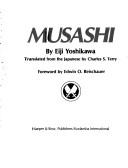Check nearby libraries
Buy this book

An epic novel of the Samauri era in Japan. First published in serial format, this novel is often called the Gone with the wind of Japan. Miyomoto Musashi was an actual historical person, but through this novel he has become part of Japan's living folklore.
Check nearby libraries
Buy this book

Previews available in: English
Subjects
Fiction, Swordsmen, Japan, fiction, Fiction, generalPeople
Musashi Miyamoto (1584-1645)Places
JapanShowing 2 featured editions. View all 11 editions?
| Edition | Availability |
|---|---|
|
1
Musashi: An Epic Novel of the Samurai Era
July 14, 1997, Kodansha International
Hardcover
in English
4770019572 9784770019578
|
zzzz
Libraries near you:
WorldCat
|
| 2 |
aaaa
Libraries near you:
WorldCat
|
Book Details
Edition Notes
Translation of: Miyamoto Musashi.
Classifications
The Physical Object
ID Numbers
Source records
marc_openlibraries_sanfranciscopubliclibrary MARC recordLibrary of Congress MARC record
Internet Archive item record
Better World Books record
Internet Archive item record
marc_columbia MARC record
marc_nuls MARC record
harvard_bibliographic_metadata record
Work Description
The classic samurai novel about the real exploits of the most famous swordsman.
Miyamoto Musashi was the child of an era when Japan was emerging from decades of civil strife. Lured to the great Battle of Sekigahara in 1600 by the hope of becoming a samurai—without really knowing what it meant—he regains consciousness after the battle to find himself lying defeated, dazed and wounded among thousands of the dead and dying. On his way home, he commits a rash act, becomes a fugitive and brings life in his own village to a standstill—until he is captured by a weaponless Zen monk.
The lovely Otsū, seeing in Musashi her ideal of manliness, frees him from his tortuous punishment, but he is recaptured and imprisoned. During three years of solitary confinement, he delves into the classics of Japan and China. When he is set free again, he rejects the position of samurai and for the next several years pursues his goal relentlessly, looking neither to left nor to right.
Ever so slowly it dawns on him that following the Way of the Sword is not simply a matter of finding a target for his brute strength. Continually striving to perfect his technique, which leads him to a unique style of fighting with two swords simultaneously, he travels far and wide, challenging fighters of many disciplines, taking nature to be his ultimate and severest teacher and undergoing the rigorous training of those who follow the Way. He is supremely successful in his encounters, but in the Art of War he perceives the way of peaceful and prosperous governance and disciplines himself to be a real human being.
He becomes a reluctant hero to a host of people whose lives he has touched and been touched by. And, inevitably, he has to pit his skill against the naked blade of his greatest rival.
Musashi is a novel in the best tradition of Japanese story telling. It is a living story, subtle and imaginative, teeming with memorable characters, many of them historical. Interweaving themes of unrequited love, misguided revenge, filial piety and absolute dedication to the Way of the Samurai, it depicts vividly a world Westerners know only vaguely. Full of gusto and humor, it has an epic quality and universal appeal.
EIJI YOSHIKAWA was born in 1892 in Kanagawa Prefecture, near Tokyo. He began his literary career at the age of twenty-two. During his thirties he worked as a journalist while continuing to write stories and novels, reaching a large and appreciative readership through having his work published, often serially, in newspapers and popular magazines. At the time of his death in 1962, he was one of Japan's best-known and best-loved novelists. He received the Cultural Medal, the highest award for a man of letters, and other cultural decorations, including the Order of the Sacred Treasure.
Links outside Open Library
Community Reviews (0)
Feedback?| February 28, 2022 | Edited by ImportBot | import existing book |
| June 10, 2017 | Edited by siznax | Added publisher description |
| November 28, 2012 | Edited by AnandBot | Fixed spam edits. |
| November 23, 2012 | Edited by 188.120.235.37 | Edited without comment. |
| December 10, 2009 | Created by WorkBot | add works page |












